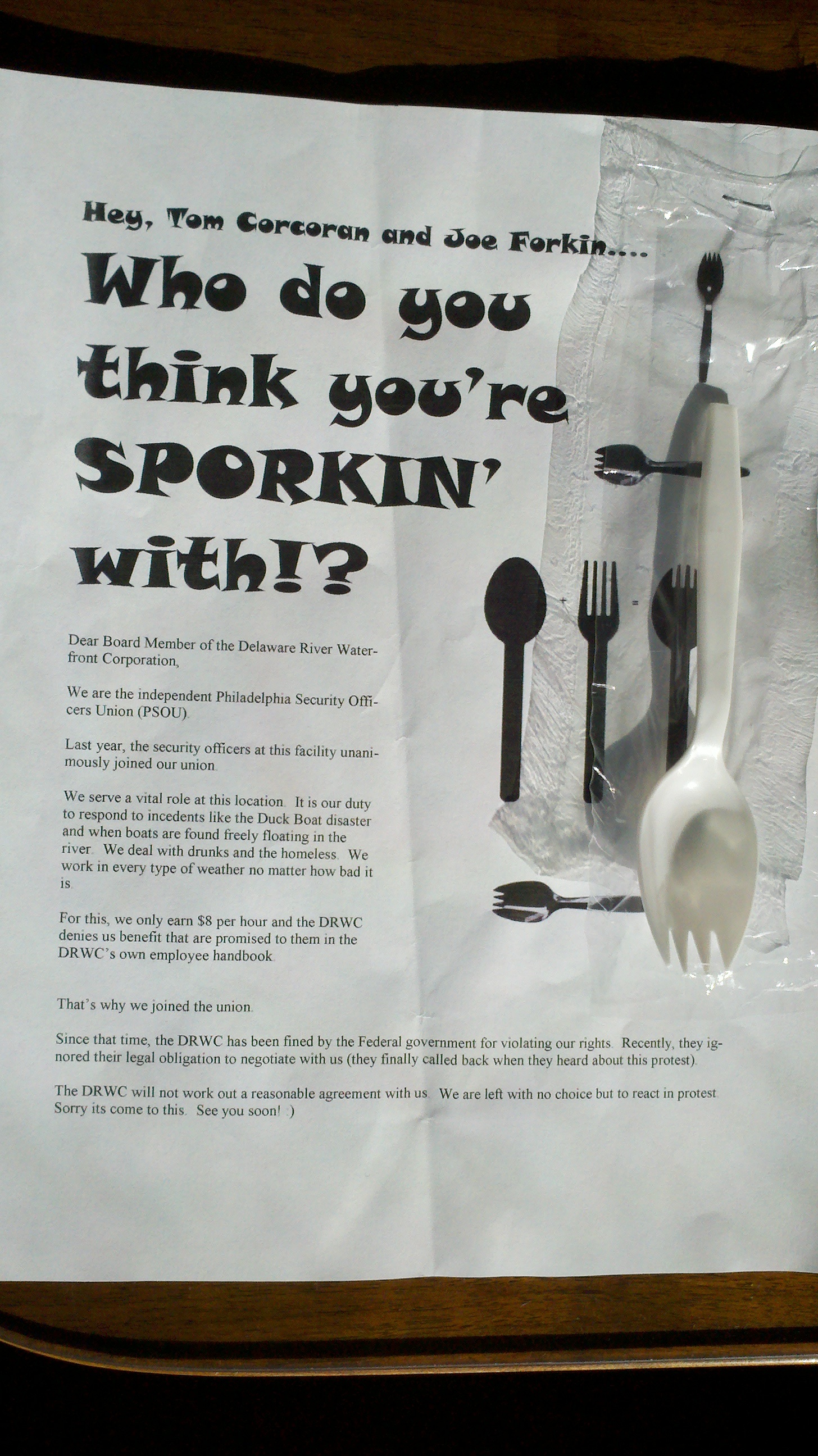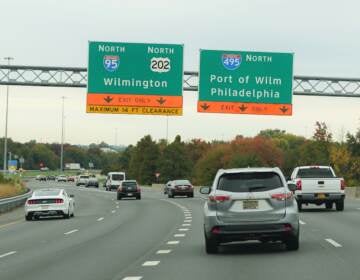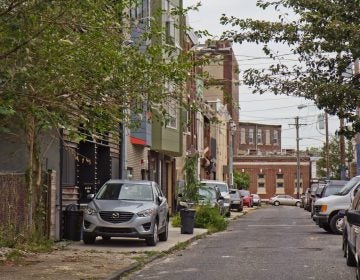Security guard union wages mild protest at DRWC meeting, but says it will escalate if necessary

Some of the roughly half-dozen members of the Philadelphia Security Officers Union who work for the Delaware River Waterfront Corporation staged a calm protest prior to Thursday’s executive board meeting.
As board members approached the DRWC offices, protesters greeted them with a flier chastising the DRWC for stalling contract negotiations. The flier is festooned with a spork – the plastic spoon/fork combo utensil – a play on the name of DRWC Vice President for Operations and Development Joe Forkin, with whom they have been negotiating.
“Hey, Tom Corcoran and Joe Forkin….Who do you think you’re SPORKIN’ with!?” the flier asks.
The union’s issues center around wages and benefits, but they also allege the DRWC cut hours and changed schedules as punishment for organizing last year and has stalled negotiations.
Forkin wouldn’t discuss the monetary offers made in ongoing talks, or any other details, saying it was counter-productive to negotiate in the media. “We’re trying to reach a good conclusion for both parites,” he said.
But Forkin said it’s the DRWC who was waiting for a counter proposal, and then a meeting date, from the union. The scheduling changes were routine, Forkin said, but the DRWC did pay $6,000 in back wages after being told to do so by the National Labor Relations Board.
The security officers, who unanimously voted to join the PSOU last year, are paid about $8 per hour.
That is not enough, the PSOU says. “It is our duty to respond to incedents (sic) like the Duck Boat disaster and when boats are found freely floating in the river,” the flier states. “We deal with drunks and the homeless. We work in every type of weather no matter how bad it is.”
PSOU is the union that represents security officers at the Philadelphia Museum of Art. Guards there make $10.88 per hour, Rodriguez said.
DRWC has “ignored their legal obligation to negotiate with us (they finally called back when they heard about this protest),” the flier states. The flier also says that DRWC “has been fined by the Federal government for violating our rights.”
Forkin said prior to the union’s organization, DRWC would post employee schedules that covered several weeks at a time, he said. Employees often worked the same shifts, Forkin said, but sometimes, management found it necessary to put someone on a different shift. This was nothing unusual, Forkin said, but such shift changes were made after the union had organized, and that’s when the union filed a complaint.
Rodriguez could not be sure Friday whether the schedule changes were posted right before or right after the workers voted to unionize, but he said schedule changes were anything but routine, and the guards felt they were made to punish them. Rodriquez said they lost wages because hours were given to contract guards. The workers were owed about $10,000, he said, but accepted $6,000 as a good-faith concession.
Forkin said the NLRB settlement was a restitution of wages, required because the board found the scheduling change should not have been made, but it was not a fine. “I firmly stand behind the fact that I was not being punitive,” Forkin said.
Rodriguez said the NLRB can’t impose a fine, techically, but it ruled in favor of the union, and that speaks for itself.
Forkin said negotiation sessions on what will be the union’s first contract with the DRWC had been happening about once every three weeks, a typical pace for such talks. Then, DRWC offered the union an economic proposal. “It took a couple of months for them to get back with a counter proposal,” he said. Forkin said he had sent the union a list of possible dates for another session and was waiting for a reply when he received a letter saying the DRWC was not negotiating in good faith. “I was like, ‘hey guys, we’ve been waiting for you,'” Forkin said.
Rodriguez said it was possible that an attorney had not gotten back to Forkin punctually, but that one day he had personally called Forkin about the dates, was promised a response the next day, and did not hear back despite calling DRWC offices for three consecutive days. “We’ve negotiated just five times,” since talks began, he said.
The flier states that DRWC is denying its security guards benefits that are promised in the employee handbook. Forkin said that he was not certain what benefits the flier referred to, but was confident no one was being denied benefits to which they are entitled. Benefits vary by type of employee, he said.
Rodriguez said the benefits, including paid vacation and sick leave, are guaranteed to every city employee, and DRWC is “clearly a city-related agency” that should provide not only those benefits, but the $10.88 city minimum wage, to its employees. The workers at the museum weren’t automatically entitled to that wage under city law, Rodriguez said, but achieved it through collective bargaining.
Forkin said that while the DRWC manages city-owned land and receives city dollars to do so, it is a separate, private, non-profit corporation. No DRWC employees receive the same benefits as city employees, he said. The DRWC is compelled only to meet the state minimum wage laws, Forkin said, and it does.
The Thursday demonstration was remarkably polite for a labor dispute. Prior to the meeting, Forkin talked with the protesters, and introduced himself to one he hadn’t met before. No one yelled. The last line of the flier: “We are left with no choice but to react in protest. Sorry its come to this. See you soon! :)”
But Rodriguez described the quiet event as a first step, and things will escalate if necessary. Look at what happened at the museum of art, he said. “It started very calmly, but all the board members all have businesses, and we know who funds the DRWC, and what their political connections are. All of that is on the table as far as targets, agitation and disruption.”
The DRWC has contracts with two other unions, the Carpenters Union and the The International Alliance of Theatrical Stage Employees, Moving Picture Technicians, Artists and Allied Crafts.
Contact the reporter at kgates@planphilly.com
WHYY is your source for fact-based, in-depth journalism and information. As a nonprofit organization, we rely on financial support from readers like you. Please give today.






